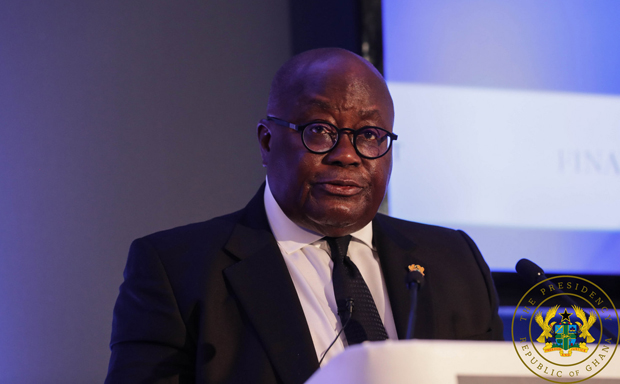President Akufo-Addo has hinted that all those owners of insolvent banks as well as savings and loans companies whose actions contributed to the banking sector crisis are going to be prosecuted.
He said the briefings given him so far are showing that the trial of those business people whose actions and inactions causedthe taxpayer over GH¢20 billion in the Bank of Ghana clean-up exercise would likely happen.
“I am expectant that the criminal conduct, if any of those responsible for the banking sector crisis, which is undergoing detailed scrutiny, will be brought to justice very soon, if prima facie evidence of criminality is found, which, according to my information, is likely,” the President said.
Addressing the 2019 Ghana Bar Association (GBA) conference currently underway in Takoradi in the Western Region on how his government is tackling corruption, President Akufo-Addo said, “The story of every bank, financial house, or savings and loans institution that has had problems can be traced to someone or some people breaking the law, or trying to cut corners by flouting regulations,” adding that “many a bad headline can be traced to a law and order problem.”
He said that he is not at the Presidency to shield any public official who has been found to be corrupt by the investigative agencies.
“So far, 21 officials of the previous administration are standing trial over their involvement in alleged acts of corruption or causing financial loss to the state, amounting collectively to the tune of some GH¢772 million.”
The President added that “their trials are being conducted in the normal manner, with the safeguards that the law affords all accused persons, so that due process is respected. The courts will, at the appropriate moment, deliver their verdicts.”
He disclosed that he is doing everything possible to ensure that government gets value for money in its engagements and must be done devoid of corruption.
According to the President, the Public Procurement Authority (PPA) under his tenure has saved for the public exchequer GH¢2.75 billion from January 2017 to July 2019 as a result of the PPA reviewing contracts brought before it for approval either under sole sourcing or restrictive tendering procedures.
That, he indicated, is in sharp contrast to the performance of the PPA in the years before 2017 when approvals were given, as a matter of course, and no savings achieved at all.
Contrary to public view that sole sourcing of contracts has soared, the President said only 47 per cent of applications for restricted tender and 56 per cent of applications for sole-sourcing were approved in 2017, as opposed to approvals of 99 per cent for restricted tender and 96 per cent for sole sourcing in 2016 when the opposition NDC was in office.
“An isolated case in point is the contract awarded in 2016 for the supply of two hundred and fifty thousand (250,000) bags of ‘Asaasewura’ cocoa fertilizer. The contract sum amounted to $11.5 million, i.e. $46 per bag of fertilizer. This same contract, under my administration, was reviewed by the PPA in 2018 for $7.87 million, i.e. $31.50 per bag, resulting in a savings to the exchequer of $3.63 million,” he said, adding, “There are many such examples.”
Ghana Beyond Aid
The President mentioned that the ‘Ghana Beyond Aid’ agenda “is the ‘steady dedication’ of patriotism that will enable us to build a ‘Ghana Beyond Aid’, a Ghana that has discarded a mindset of aid, dependency, charity handouts, and chartered a path of self-reliance for her progress and prosperity, grounded on an intelligent, disciplined use of her considerable human and material resources. A new Ghanaian civilization beckons.”
Freedom of Expression
He recounted how as Attorney General, under the Kufuor administration, “I led the process in Parliament for the repeal of the Criminal Libel Law. In my time as President, the Right to Information Act, whose passage had, hitherto, become a taboo, was finally enacted by Parliament.”
The President insisted that “my attachment to the vital nature of freedom of expression in promoting national progress and security has not changed since I became President.”
“Ghanaians are today, as they have been doing for much of the 4th Republic, able to give boldly and freely their feedback on policies and programmes of government; civil society organisations are able to interrogate fearlessly government actions and positions, compare them to global best practices, and offer views and critiques aimed at complementing the efforts of government; and the political opposition is able to raise dissent openly, and canvass without intimidation for alternative viewpoints.”
The President said there was the need for continuous training, self-regulation and an insistence on acceptable media ethics and journalistic standards by the media and its practitioners as part of the process of installing a culture of accountable governance, requiring high standards and professionalism.
He pointed out that his administration does not have any intention to suppress freedom of expression in Ghana.
Media Infractions
The President said the media should accept their mistakes anytime there are infractions, saying, “Politicians are not the only persons who make mistakes. Media practitioners, like all human beings, can also make mistakes, and when they do, they should have the humility to acknowledge their error, and not have their misdeeds atoned under the guise of ‘media freedom’.”
He added that “irresponsible media practice is an abuse of freedom of expression, not its manifestation


